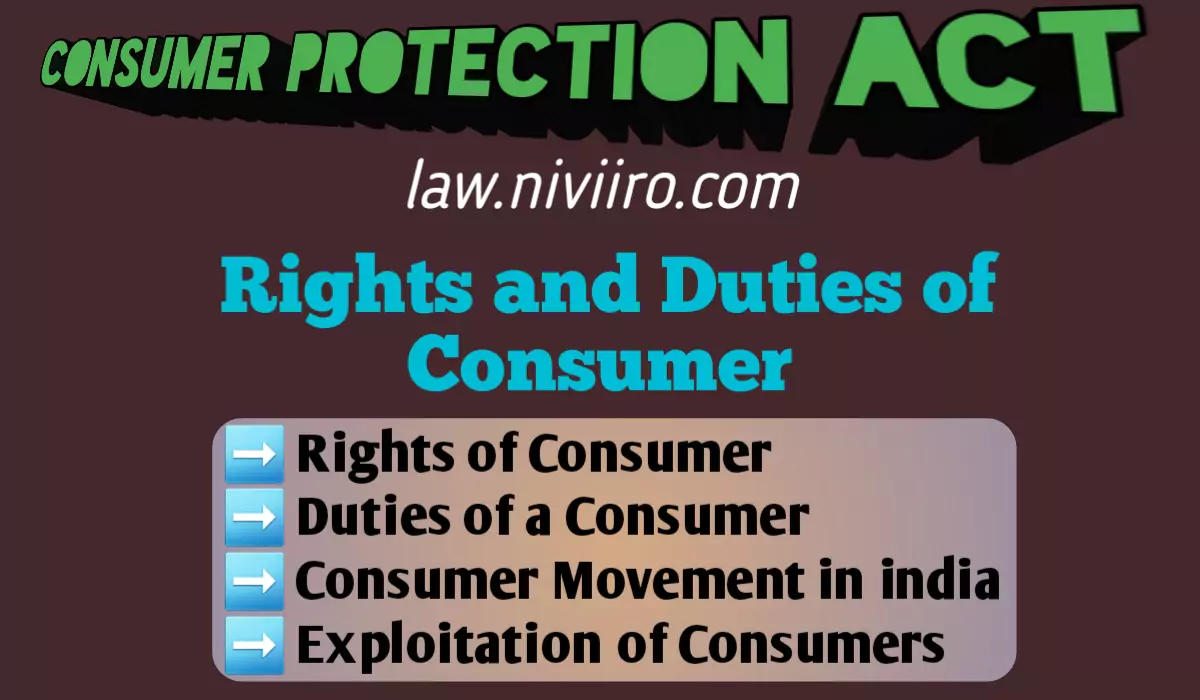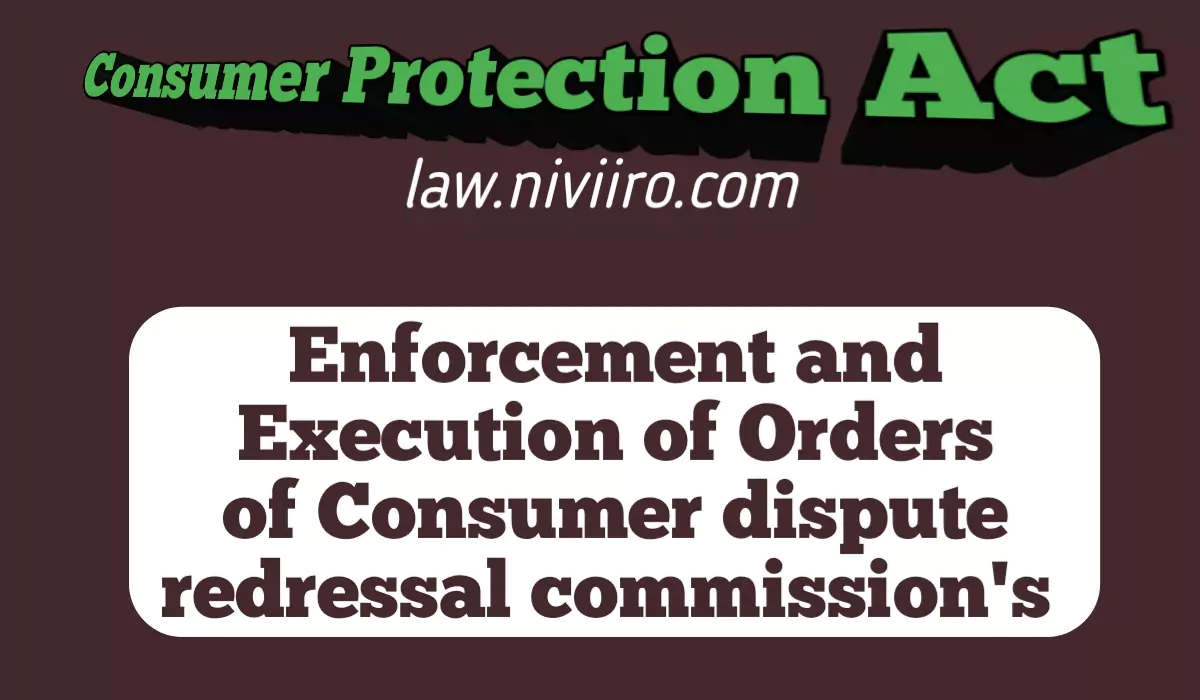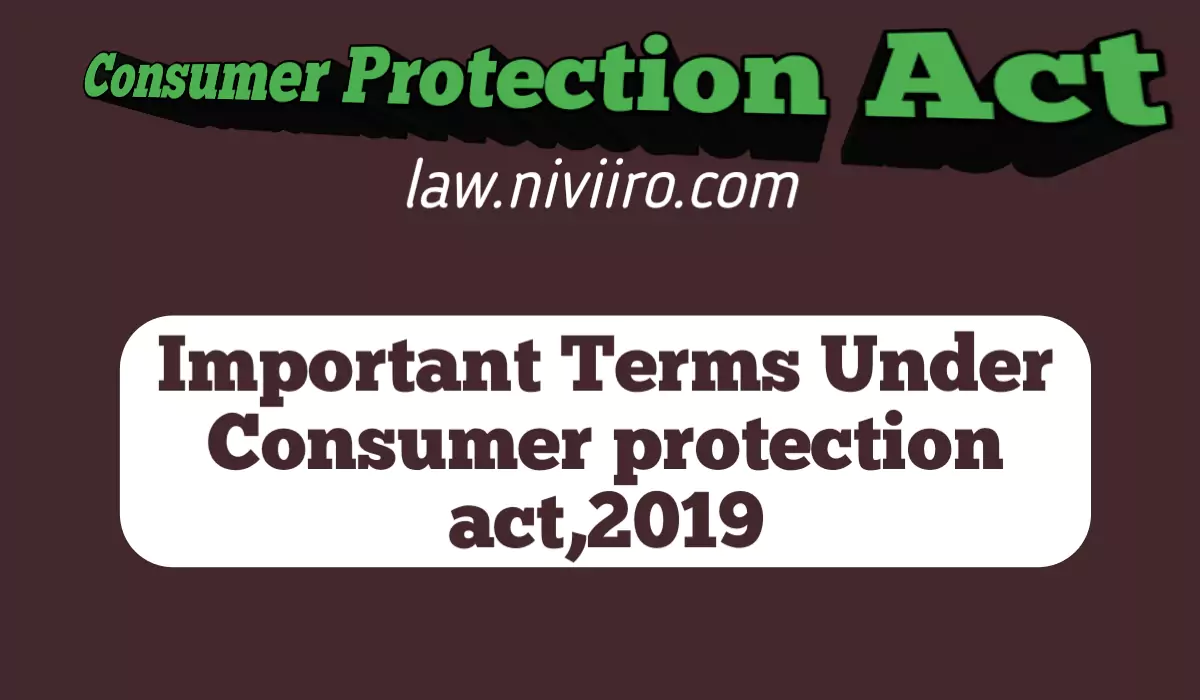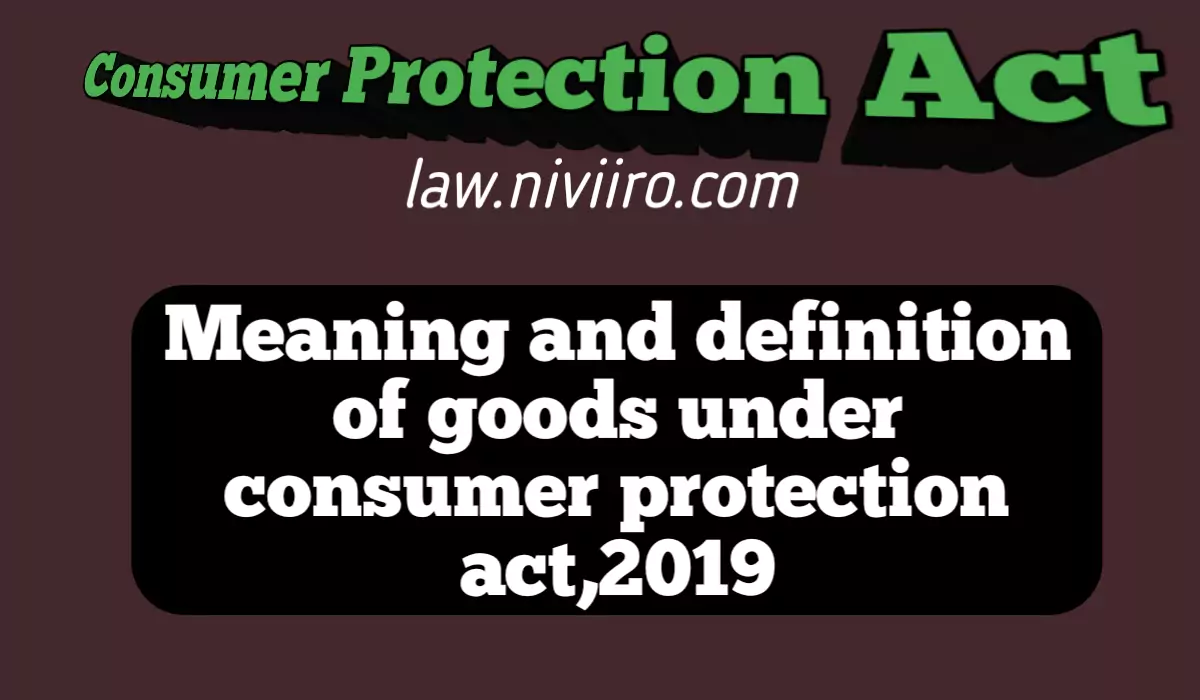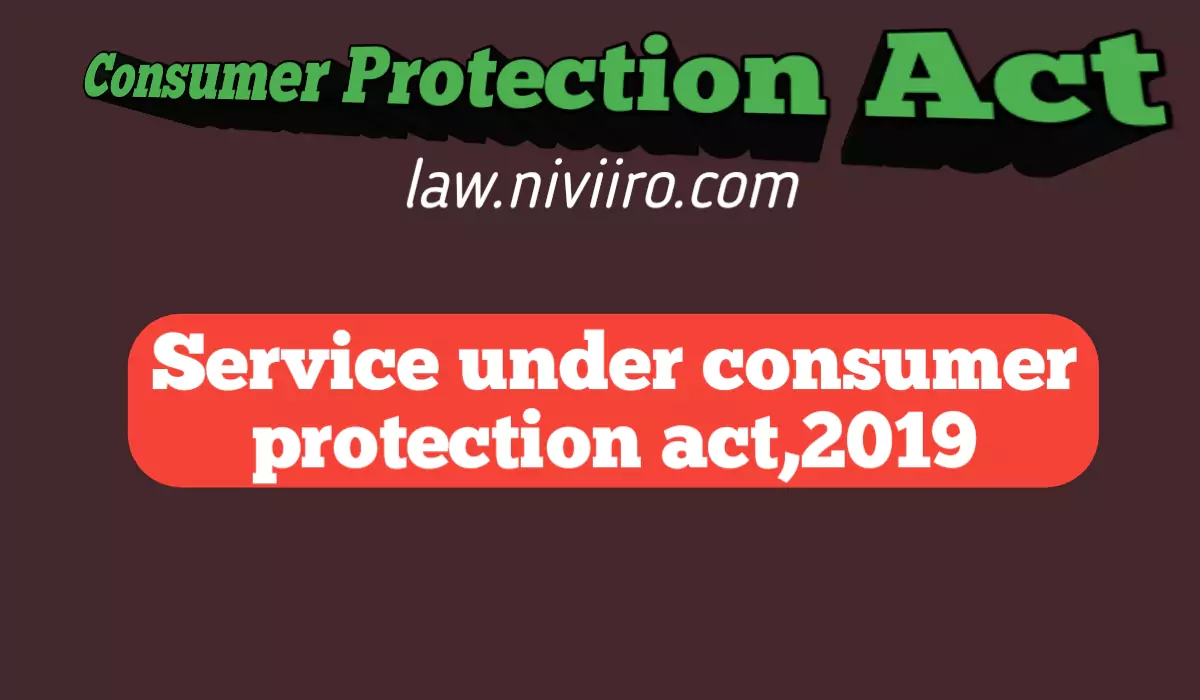Rights and Duties of consumers : When it comes to buying goods and services, consumers have certain rights and obligations. These duties and rights are intended to shield customers from dishonesty, fraud, and unethical business practises. Some of the most important consumer rights and obligations are listed below :
Rights of consumers | Rights and Duties of consumers
The Consumer Protection Act, 1986 provides certain rights to consumers to ensure that they are not exploited or cheated by businesses or service providers. These rights enable consumers to make informed purchasing decisions, seek compensation for defective goods or services, and hold businesses accountable for any wrongdoing. These rights are as follows:-
1. Right to safety | Rights and Duties of consumers
The consumers have the right to be protected against the marketing of goods and services, which are hazardous to life and property. The goods and services purchased should not only meet their immediate needs, but also their long-term interests. Producers must strictly adhere to the necessary safety rules and regulations. Many of the goods and services we buy necessitate extra caution in terms of safety. Before making a purchase, Consumers should insist on the quality of the products as well as the guarantee of the products and services. They should preferably buy quality-marked products such as ISI, AGMARK, etc.
2. Right to information |Rights and Duties of consumers
To protect the consumer from unfair trade practices, the consumer has the right to be informed about the quality, quantity, potency, purity, standard, and price of goods. Before making a choice or decision, consumers should insist on receiving all available information about the product or service. This will allow him to act wisely and responsibly, as well as avoid falling victim to high-pressure selling techniques. If the product is defective in any way, the consumer can file a complaint and request compensation or a replacement.
3. Right to choose | Rights and Duties of consumers
The consumer has right to be assured, wherever possible of access to variety of goods and services at competitive price. In case of monopolies, it means right to be assured of satisfactory quality and service at a fair price. It also includes right to basic goods and services. Any consumer who receives a service in whatever capacity, regardless of age, gender and nature of service, has the right to choose whether to continue to receive the service.
4. Right to be heard | Rights and Duties of consumers
Consumers have the right to be heard, and their interests will be taken into account in appropriate forums. It also includes the right to be represented in various forums formed to consider the consumer welfare. Consumers should form non-political and non-commercial consumer organisations that can be represented in various consumer committees formed by the government and other bodies.
5. Right to seek redressal | Rights and Duties of consumers
Consumers have the right to seek redressal if they are subjected to unfair trade practises or unscrupulous exploitation. It also includes the consumer’s right to a fair settlement of genuine grievances. A consumer has the right to seek compensation for any damage caused by a product or service. He or she may sue the shopkeeper or manufacturer in a consumer court. They can also seek redress of their grievances through consumer organisations.
6. Right to consumer education | Rights and Duties of consumers
Consumers have the right to obtain the knowledge and skills required to be informed consumers. Consumers’ ignorance is mainly responsible for their exploitation. The government or another organisation should take steps to educate citizens about various aspects of consumer welfare. Consumer education provides a person with the basic knowledge to deal with consumer issues; he or she becomes a discriminating buyer by making rational decisions and, as a result, does not fall victim to advertisements or persuasions.
Duties of a Consumer | Rights and Duties of consumers
- Buying quality products at reasonable price.
- Read information carefully on the packets before purchase.
- To check the weights and measures before making purchases.
- Insist on receipts or bill without fail, on all the purchases made.
- Do not feel tempted on misleading advertisements.
- Buy standardized products only i.e., of ISI.
- File consumer complaints against default in goods, deficiency in services, or unfair trade practice.
Consumer Movement in India
Consumer movements are organisations that work to raise public awareness. In India, the consumer movement as a social force arose from the need to protect and promote consumers’ interests against unethical and unfair trade practises. Until the 1970s, consumer organisations were mostly concerned with writing articles and organising exhibitions.
They formed consumer groups to investigate ration shop malpractice and road overcrowding. Because of all of these efforts, the movement was able to put pressure on business firms as well as the government to correct business practises that were unfair and against the interests of consumers in general. The Consumer Protection Act, 1986, was a significant step taken by the Indian government in 1986.
The Consumer Protection Act was enacted in 1986 to protect the interests of Indian customers. It provides for the establishment of consumer councils and other authorities for the resolution of consumer disputes and related matters. This Act was passed in 1986 with the objective of better protecting the interests of consumers. The Act provides effective consumer safeguards against various types of exploitations and unfair dealings, relying primarily on compensatory rather than disciplinary or preventive measures. Unless specifically exempted, it applies to all goods and services in the private, public, and cooperative sectors.
It is also quick and inexpensive. The rights granted by the Act are derived from the rights enshrined in Articles 14 to 19 of the Indian Constitution. The Act established a three-tier quasi-judicial consumer dispute redressal mechanism at the national, state, and district levels to facilitate and reduce the cost of resolving consumer disputes.
These are the consumer movement’s needs :
- Providing consumer education
- Providing consumer protection
- Providing guidance to consumer
- Fight against marketing system
- Consumer awareness
- Building pressure on government
- Arranging consumer protection programmes
- Organizing public opinion
Now, for the furtherance of the objectives of the 1986 Act and to address the issues and shortcomings of the 1986 Act, the Consumer Protection Act, 2019 was enacted and is now in force at this moment. The consumer movement in India started in the early 1960s with the formation of the Consumer Guidance Society of India (CGSI). Mahatma Gandhi, who is considered the father of the nation, had a strong belief in the rights of the consumer.
He believed that “A Consumer is the most important visitor on our premises. He is not dependent on us, we are on him. He is not an interruption to our work; he is the purpose of it. We are not doing a favour to a consumer by giving him an opportunity. He is doing us a favour by giving an opportunity to serve him.” Despite these words of Mahatma Gandhi, it remained for a long time that consumers had to take responsibility while purchasing goods and services. Gandhi also believed that consumers should have the right to be heard and have a say in the policies that affect their lives.
The CPA, 2019 has brought about some important changes in the consumer protection landscape in India. Some of the key changes are:
- Centralized Consumer Protection Authority: The CPA, 2019 establishes a Central Consumer Protection Authority (CCPA), which will have the power to investigate, recall, and impose penalties on manufacturers and service providers who violate consumer rights.
- E-Commerce regulations: The act provides for the regulation of e-commerce platforms and mandates them to disclose information about the products or services offered on their platform, as well as the terms and conditions of sale.
- Product Liability: The CPA, 2019 introduces the concept of product liability, which holds manufacturers and service providers liable for any harm caused to consumers due to defective products or deficient services.
- Mediation and Dispute Resolution: The act introduces mediation as a means of resolving disputes between consumers and service providers. This is expected to provide a speedy and cost-effective resolution of disputes.
Exploitation of Consumers | Rights and Duties of consumers
Consumers can still be exploited under Consumer Protection Act in several ways, despite its existence. It is important for consumers to be aware of their rights and to be vigilant when engaging in commercial transactions to avoid falling victim to these exploitative practices.
As a result of the expansion of business activities in any economy, we have a wide range of goods available in the market. Advertisements on television, in newspapers, and in magazines influence the demand for goods and services. Companies spend a lot of money on advertisements to attract customers and feed us information that they want us to know, but not information that we want. When we, as consumers, lack sufficient information about products, we are oftenly exploited and, in some cases, victimised by the business community. The following are the circumstances in which consumers were exploited:
False Advertising: Companies may make false or misleading claims about their products or services to entice consumers to buy them. For example, a company might claim that its product can cure a disease when it cannot. This can lead consumers to spend money on products that do not work as advertised.
Hidden Fees: Companies may hide fees and charges in the fine print of contracts or agreements. Consumers may not be aware of these fees and charges until they are billed for them, leaving them feeling cheated.
Unfair Contract Terms: Companies may include unfair terms in their contracts or agreements, which can put consumers at a disadvantage. For example, a company might include a clause that allows it to change the terms of the contract at any time, without giving consumers any notice.
Poor Quality Products or Services: Companies may sell products or services that are of poor quality or do not meet consumer expectations. This can leave consumers feeling dissatisfied and out of pocket.
Excessive Pricing: Companies may charge excessive prices for products or services, taking advantage of consumers who do not have the time or knowledge to compare prices. This can result in consumers paying more than they should for goods and services.
Furthermore, exploitation can arise due to Limited supplies, Underweight and Under-measurements, Duplicate Articles, Labeling and Packaging, Sales, Credit Protections, Limited Competition, Illiteracy.
‘JAGO GRAHAK JAGO’ and ‘National Consumer Helpline’ | Rights and Duties of consumers
“Jago Grahak Jago” is a consumer awareness campaign launched by the Indian government in 2005 that promotes consumer rights, encourages consumers to be informed and vigilant when purchasing goods and services, and provides a platform for consumers to seek redress of grievances. The campaign is led by the Department of Consumer Affairs, Ministry of Consumer Affairs, Food and Public Distribution. It uses various channels such as television, radio, print, and social media to reach out to consumers across the country.
The campaign also works towards building a responsible and responsive consumer movement in the country. The campaign also has its own website where consumers can file complaints, get information, and register their complaints. The website provides information on a variety of consumer-related topics; including product safety, fake products, and consumer rights. The slogan ‘Jago Grahak Jago’ means “Wake up, consumer, wake up!” and it emphasizes the need for consumers to be vigilant and aware of their rights.
The ‘National Consumer Helpline’ (NCH) is a flagship project under the ‘JAGO GRAHAK JAGO’ campaign. NCH was started on World Consumer Rights Day i.e., 15th March, 2005. NCH has a toll free number 1800-11-4000, 011-27006500 (normal call charges), sms number 8800939717 and website www.nationalconsumerhelpline.in that allows customers to register their complaints and grievances about products and services. To ensure timely and effective resolution of consumer complaints, the NCH acts as a nodal agency between consumers and companies/service providers. It also informs consumers about their rights and responsibilities, allowing them to make more informed decisions when purchasing goods and services. The NCH operates in 14 languages and serves customers from all over India.
Related Post | Rights and Duties of consumers
1. Who can file complaint?
(a) Consumer
(b) Voluntary Consumer Association registered under any law
(c) Government (Central and/or State Government)
(d) One or more consumers having same interest
2. When National Consumer Day and World Consumer Rights Day (or World Consumer Day) is celebrated and why?
National Consumer Day is celebrated on 24th December commemorating the coming into effect of the Consumer Protection Act, 1986.
World Consumer Rights Day is celebrated on 15th March every year. As on this date i.e., on 15th March, 1962 President John F. Kennedy while addressing the US Congress raised the issue of consumer rights.
3. What is ‘JAGO GRAHAK JOGO’ and ‘National Consumer Helpline.’
The slogan ‘Jago Grahak Jago’ means “Wake up, consumer, wake up!” and it emphasizes the need for consumers to be vigilant and aware of their rights. It is a consumer awareness campaign launched by the Indian government in 2005 that promotes consumer rights and provides a platform for consumers to seek redress of grievances…..
4. What are the problems faced by consumers?
(a) Illiteracy and Ignorance
(b) Unorganised Consumers
(c) Spurious Goods
(d) Deceptive Advertising
(e) Adulteration
(f) Irregular Supply Other Problems
5. What reliefs may be granted under CPA?
(a) Removal of defects in goods
(b) Replacement of goods with new ones
(c) Return of price paid by complainant. Compensation-now punitive damages also
(d) Discontinuance of services
(e) Stop sale of hazardous goods
(f) Corrective advertisements to neutralize the effects of misleading advertisements
(g) Adequate costs to parties
6. What do you mean by consumer movement?
Consumer movements are organisations that work to raise public awareness. In India, the consumer movement as a social force arose from the need to protect and promote consumers’ interests against unethical and unfair trade practises. Many efforts made the ……
7. Write the salient features of consumer protection act, 1986.
1) The Act provides for the establishment of Consumer Protection Councils at district, state and at national level for promoting and protecting the rights of consumers.
2) The Act provides for the establishment of three-tier Consumer Disputes Redressal Agencies at the district, state and national levels for speedy and inexpensive resolution of consumer disputes………
8. Write the salient features of consumer protection act, 2019.
1) The Act provides for the establishment of the Central Consumer Protection Authority (CCPA) as the primary regulatory authority for consumer protection.
2) The Act includes provisions for e-commerce transactions and defines the roles and responsibilities of e-commerce entities……..
9. What are the circumstances in which consumers were exploited?
(a) False Advertising
(b) Hidden Fees
(c) Unfair Contract Terms
(d) Poor Quality Products or Services
(e) Excessive Pricing
Reference Books | Rights and Duties of consumers
- Commentary on the Consumer Protection Act by J. N. Barowalia
- Consumer Protection Act: A Commentary by G. B. Reddy
- Consumer Protection (Law & Practice) by V. K. Agarwal













